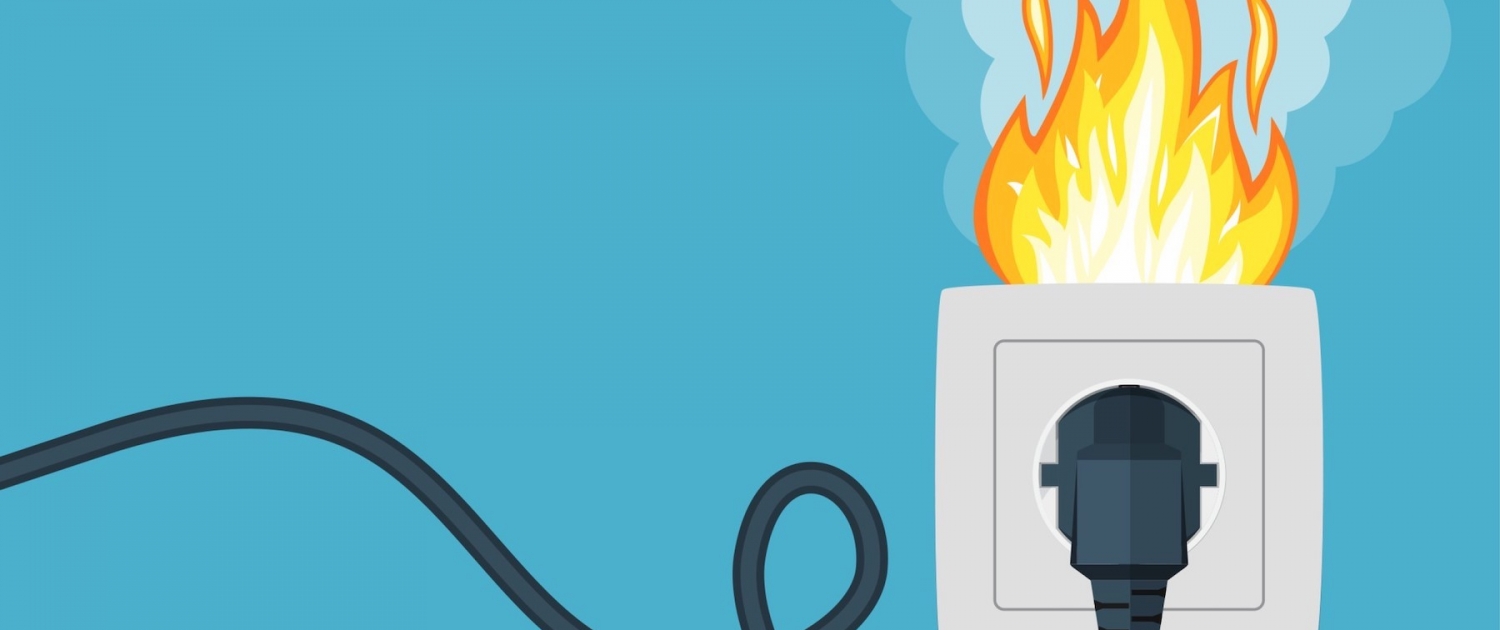What Causes Electrical Fires: 4 Factors & How To Prevent Them
The National Fire Protection Association has made several determinations on what causes electrical fires and reported that electrical failure or malfunction is one of the main contributing factors to home fires. Furthermore, the U.S. Fire Administration, estimates around 24,000 residential fires are reported each year that have an electrical cause.
Some of the key facts outlined in the USFA report talked about electrical fires mostly occurring in one- and two- family homes, and the bedrooms being the most common starting point. However, it also notes leading causes of electrical fires:
- The structural member or framing (18%), electrical wire and cable insulation (31%) are among the leading items to cause electrical fires in residential buildings.
- Other factors which most often contribute to the ignition of electrical fires are: electrical malfunction (43%), electrical failure, short-circuit arc from defective, worn insulation (11%) and unspecified short-circuit arc (23%).
Below, you’ll be able to find out more about the most common causes of electrical fires, but also steps you can take and more info on how to prevent them:
1. Faulty Wiring, Outlets or Appliances
A staggering number of electrical fires are caused by either faulty wiring, outlets or old appliances. Fixing these problems might considerably reduce the risk of an electrical fire.
Wide-screen televisions, computers, kitchen appliances of all sorts, air conditioners, you will probably find more appliances in today’s homes than you did 20 years ago. If you are living in an old house, you should check the entire wiring, as this might not sustain the increased number of appliances, exposing you to high fire risk.
When too much power goes through a circuit, it gets overloaded and, under normal circumstances when everything functions properly, breakers should be triggered. However, in the case of outdated breaker boxes, this doesn’t happen. Because the connectors often get worn out and stop functioning correctly, the system will overload, eventually causing an electrical fire.
As mentioned above, some of the most common causes of electrical fires are aging appliances and defective electrical outlets. In addition, faults in switches, receptacles and appliance cords can also start a fire. Avoid using appliances with a worn out or broken cord, which heat up your floors, rugs or curtains, potentially starting a fire.
Another thing to avoid is running cords under rugs, as these are combustible surfaces and can easily ignite. Two-prong electrical outlets are also not recommended, and electricians will often advise to switch to a grounded outlet with an extra prong, which can handle the additional electricity the appliances carry.
How to Prevent It
Taking preventive measures is the best way to stop electrical fires. Wiring should always be checked by a qualified electrician, who will perform a thorough electrical inspection of your home and replace old wiring if needed. The wiring, the electrical wall outlets and the external power panels, all need to be thoroughly checked.
You might also want to have high-quality smoke detectors and more than one electrical fire extinguisher installed in your home, just in case. It really helps minimize the damage as much as possible.
One thing you can do yourself is check your appliances. Look for exposed wires or cords that might create excessive heat. Repair or replace aging, faulty appliances immediately, before these cause significant damage.
2. Cords and Overloaded Circuits
One of the major electrical fire risks is the inadequate distribution of power. When a single extension cord is used to supply a large number of appliances with power, it creates an overload, exposing you to a serious fire risk.
However, not all houses, especially old ones, are designed with a sufficient number of outlets. So, as the number of home appliances grows, as well as electronics, more and more people are using extension cords and overloading their circuits.
Not only that, but another aspect to pay attention to are entangled cords, or smashed ones. These are also a common electrical fire cause, as, in time, they can melt the insulation.
How To Prevent It
Installing additional power outlets in your home is the first step to take. Always have a qualified electrician do that. If you absolutely have to, choose heavy-duty extension cords for all of your appliances and avoid placing them in high-traffic areas or under your rugs, as these are combustible surfaces.
3. Lighting Fixtures, Bulbs & Lamps
Lighting fixtures, as well as bulbs and lamps, are among the leading causes of electrical fires. You should always check and respect the maximum recommended wattage when having to install a light bulb. If a 60-watt light bulb is recommended for a lighting fixture, avoid installing a 100-watt one. By going for a bulb with a higher wattage than the one recommended, you might not be getting better lighting, but a higher risk of electrical fire.
Fabrics and different kinds of materials placed over your lampshades have also been known to cause fires. Cloth or paper can easily heat up and ignite. Moreover, damaged light fixtures and lamps can often be the cause of electrical fires.
How To Prevent It
Respect all wattage power supply recommendations, both in terms of light bulbs and electrical sockets. If you notice that certain light fixtures or lamps in your home are excessively hot when used, consider replacing them.
It is best not to use extension cords for lighting devices. However, if you must, do so on a limited period and replace all faulty or entangled cords. If you notice that your lighting devices flicker, make sure you check for any light switch problems. If this is not the case, consider replacing those devices.
Last but not least, never use paper or cloth to cover a lamp. As said, these are combustible materials and, if the lamp overheats, they increase the risk of a fire.
4. Portable Space Heaters
Portable space heaters are quite risky when it comes to electrical fires. If you use space heaters during winter, make sure that you don’t leave them on, unsupervised for long periods of time.
Because these are portable appliances, a lot of people tend to bring them too close to their bed, sofas, and therefore to flammable surfaces, such as curtains, beddings, even rugs. You can consider choosing radiator-type heaters, as these are less likely to cause fires. Even so, keeping them at a safe distance from combustible materials is wise.
How To Prevent It
Make sure that your portable space heater is positioned at a safe distance from all inflammable fabrics and consider using radiation heaters. Additionally, ensure that your heating device is up-to-date with all safety features.
Follow all recommendations regarding power supply and plug it directly into a wall outlet. Never leave the heater running over a long period of time and when you are not present.
A Simple Electrical Upgrade Can Upgrade Your Quality of Life
The right electrical upgrade can dramatically improve the value and appearance of any home or business. You’ll be amazed at what a difference the right electrical upgrade can make for your home or business. Make sure that when you select an electrical company to do the enhancement of your home and you have decided to take your enhancement to the level where you require an electrical upgrade that the technician at the company has a good working knowledge and the experience to properly guide you in this area.
When you decide to upgrade, our well-trained and certified electricians have all the experience and training needed to complete your electrical panel upgrade project from start to finish, with a minimum of fuss or disturbance. Please contact us right away at 310-800-2401






